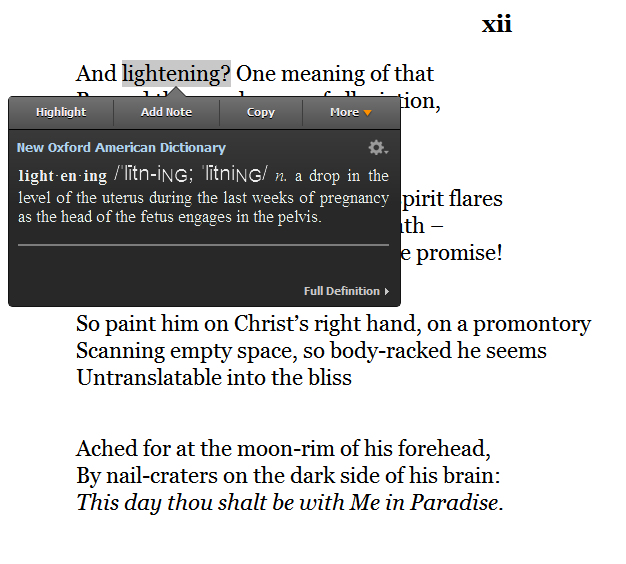I’ve come across a pair of definitions for lightening (n.) which, while not antonymous (or antagonymous) nonetheless represent a kind of polarity. And not any old polarity–the polarity, probably.
The first definition comes from the Oxford American Dictionary:
A drop in the level of the uterus during the last weeks of pregnancy as the head of the fetus engages in the pelvis.
[The British & World version is identical but for the substitution of ‘womb’ for ‘uterus’–I had not realized this was a AmE-BrE distinction]. This is the only definition under this lemma in Oxford Dictionaries Online, which is a bit odd, as the Oxford English Dictionary has two separate lightening lemmas (one for each sense of light, i.e. the opposite of dark and the opposite of heavy)–and each lemma has two definitions.
None of the OED definitions corresponds to the sense quoted above, but in lightening, n.2, 1b, we find the phrase a lightening before death, which is defined thuswise:
that exhilaration or revival of the spirits which is supposed to occur in some instances just before death.
OED hasn’t updated this entry since 1903, and may rearrange things on revision. But for now a lightening before death is understood to belong to the second lightening lemma, ‘the shedding or shining of light, suffusion with light, lighting up’. The first cited use is from Romeo and Juliet (and is self-debunking, as it refers to a previous usage): ‘How oft haue many at the houre of death Beene blith and pleasant? which their keepers call A lightning before death.’
There are other contexts where the light/dark and light/heavy converge (a light mood is one – is that bright, or free of the weight of one’s troubles), but this one is rather extraordinary: lightening as a precursor to birth and to death; an unburdening to begin life and an undarkening to end it.
Yet to get around to this way of seeing it one has to cobble together definitions from multiple dictionaries, each with its own way of treating lemmas, phrases, etc.. Merriam Webster, for example, would be no help at all, as it does not split the lemmas, giving lightening only as a form of lighten, v., which entry lumps in both the un-dark and un-heavy senses together.
And then there is Seamus Heaney, who tests out the connotative extensions of the word in his sequence “Lightenings”, finding he must also contend with denotations:
And lightening? One meaning of that
Beyond the usual sense of alleviation,
Illumination, and so on, is this:A phenomenal instant when the spirit flares
With pure exhilaration before death –
The good thief in us harking to the promise!
(“Lightenings, xii”)
If by chance you mistakenly click on the key term in your Kindle, you get this, which produces a somewhat odd effect:
[click to biggen]

No Comments